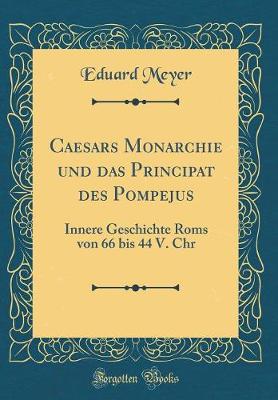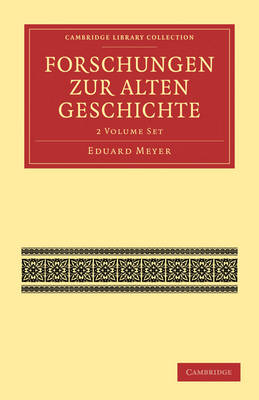Cambridge Library Collection - Classics
2 primary works • 5 total works
Volume 1
Forschungen zur Alten Geschichte: Volume 1, Zur AElteren Griechischen Geschichte
by Eduard Meyer
Published 19 August 2010
The German historian Eduard Meyer's two-volume work on ancient history was first published in 1892-1899. More than any other historian of his time Meyer (1855-1930) insisted on considering world history as a whole, even in the classical period, rather than adopting the traditional subdivision into Roman, Greek and Oriental categories. He was also convinced that a combination of philological and historical approaches was needed for an accurate interpretation of history. In Volume 1 (1892) Meyer gives a thorough account of the Pelasgian people in places such as Attica, the island of Lemnos and Thessaly. He also develops a theoretical framework within which to interpret the question of the history of the Pelasgians and the origin of the Ionians. Meyer pays particular attention to the chronology of the work of the Greek historian Herodotus, placing it in the more general context of Greek historiography and chronology.
Volume 2
The German historian Eduard Meyer's two-volume work on ancient history was first published in 1892-1899. More than any other historian of his time Meyer (1855-1930) insisted on considering world history as a whole, even in the classical period, rather than adopting the traditional subdivision into Roman, Greek and Oriental categories. He was also convinced that a combination of philological and historical approaches was needed for an accurate interpretation of history. In Volume 2 (1899) Meyer focuses almost entirely on Greek history of the fifth century BCE, except for some discussion of the governments of the Persian and Spartan kings. Meyer traces the biography of the statesman Cimon, accounts for the history of Attica and evaluates the historical value of Thucydides' work. A remarkable feature of this volume is Meyer's almost constant dialogue with the findings and publications of other scholars working within the field.
Eduard Meyer (1855-1930) was a distinguished German historian of antiquity whose interests spanned ancient Greece, Rome and Egypt. After his doctoral studies he worked as private tutor for the British consul general in Constantinople. He lectured on ancient history at various German universities and became a professor at Berlin University (1902-23), where he was appointed rector in 1919. This book on the origins of the Roman Empire was first published in 1918; this reissue reproduces the 1922 third printing. It describes the rise of Pompey and his relations with Caesar and Crassus, the rift between Pompey and Caesar, and the civil war. Meyer analyses Caesar's ambitions, the interventions of Sallust and Cicero, and the socio-economic and military situation of the Roman empire under Caesar, before describing the conspiracy that led to his murder. He supports his arguments by close reference to contemporary Latin sources.
The German historian Eduard Meyer's two-volume work on ancient history was first published in 1892-1899. More than any other historian of his time Meyer (1855-1930) insisted on considering world history as a whole, even in the classical period, rather than adopting the traditional subdivision into Roman, Greek and Oriental categories. He was also convinced that a combination of philological and historical approaches was needed for an accurate interpretation of history. In Volume 1 Meyer gives a thorough account of the Pelasgian people in places such as Attica, the island of Lemnos and Thessaly, paying particular attention to the chronology of the work of the Greek historian Herodotus. Volume 2 is devoted almost entirely to the Greek history of the fifth century BCE, focusing on Attica, Cimon and Thucydides, with additional discussion of the governments of the Persian and Spartan kings.
The German historian Eduard Meyer's two-volume work on ancient history was first published in 1892-1899. More than any other historian of his time Meyer (1855-1930) insisted on considering world history as a whole, even in the classical period, rather than adopting the traditional subdivision into Roman, Greek and Oriental categories. He was also convinced that a combination of philological and historical approaches was needed for an accurate interpretation of history. In Volume 2 (1899) Meyer focuses almost entirely on Greek history of the fifth century BCE, except for some discussion of the governments of the Persian and Spartan kings. Meyer traces the biography of the statesman Cimon, accounts for the history of Attica and evaluates the historical value of Thucydides' work. A remarkable feature of this volume is Meyer's almost constant dialogue with the findings and publications of other scholars working within the field.



